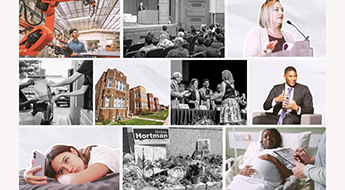Community Partnerships Produce Better Services and Research
Get all our news
To start a study, I can always write down a mathematical model or propose a certain question to test. But I always start off by asking a partner, what they see as the important questions.”
Lori Beaman
Associate professor of economics and an IPR fellow

“We need the type of rigorous research that can help us get to places where we can make a difference in the lives of our kids,” said moderator Paul Goren as he opened the IPR@50 panel on community partnerships.
Goren, who has significant experience in education foundations, research, and administration, pursued bigger picture questions—touching on trust and responsiveness and doing “good research while doing good”—with panelists who have been intimately involved in such partnerships—Penny Bender Sebring of the University of Chicago Consortium on School Research, IPR economists David Figlio and Lori Beaman, and IPR developmental psychologist Lindsay Chase-Lansdale.
Figlio, who is also dean of the University’s School of Education and Social Policy (SESP), stressed that researchers’ work improves when they are open to practitioners’ ideas, and that Northwestern researchers will be better the more they work with partners “as equals.”
“These partnerships changed my life,” he said, recalling how his experience of talking through ideas over lunch with a Florida school administrator led the two to coauthor a paper that became his top-cited journal article.
In discussing the Consortium’s long-running partnership with the Chicago Public Schools (CPS), Sebring noted it has contributed to improvements in key outcomes for the ensuing research—it is not only more relevant and more rigorous, but also more focused on issues important to practitioners, who are more likely to use it.
She cited how a Consortium study of Freshman OnTrack, an indicator related to graduation, generated more questions, and the ensuing conversations led to a follow-up study showing that attendance, a factor that educators can influence, was the strongest predictor of being on track to graduate. It was far more predictive than students’ socioeconomic and racial backgrounds. CPS adopted the Freshman OnTrack indicator for its accountability system and began investing in initiatives to strengthen ninth grade attendance and engagement. This, plus ongoing research, helped raise CPS high school graduation rates over a decade from 57 to 76 percent.
“The last thing I’ll say is that our enthusiasm for partnerships extends to NEERA, the Northwestern-Evanston Educational Research Alliance,” Sebring said, which her family foundation supports.
Beaman described her experiences with partners in running randomized controlled trials in West Africa and India.
“To start a study, I can always write down a mathematical model or propose a certain question to test,” Beaman said. “But I always start off by asking a partner, what they see as the important questions.”
In asking this of her research partners, including international NGOs, local groups, and residents of the villages where the research takes place, she collects answers that can refine her questions and also better align them to the vision for that research from the head office down to the field. Without doing so, “You’re not going to produce research that is very useful in the policy space, but you’re also not going to … ask the most relevant question,” Beaman said.
Chase-Lansdale, who is Northwestern’s vice provost for academics, spoke about how coming to IPR, SESP, and Northwestern in 1999 was “life changing” for her because of the multidisciplinary emphasis on child and family policy.
The IPR/Northwestern environment has also been especially welcoming to researchers working across schools at Northwestern and with community partners, Chase-Lansdale said.
She explained how this atmosphere engendered and supported new research initiatives like that of IPR’s Cells to Society (C2S): The Center on Social Disparities and Health, which she founded—or more recently, her work on the Two-Generation Education Initiative. Relying on many community partnerships, the latter project examines innovative programs that provide high-quality education and job training to low-income parents combined with Head Start for their young children.
New insights rarely come from “extraordinary genius,” Figlio concluded. Rather, scholarly breakthroughs are much likely to come out of “observing the world and talking with other people who are engaged in the world.”




Lori Beaman is associate professor of economics and an IPR fellow. Lindsay Chase-Lansdale is the Frances Willard Professor of Human Development and Social Policy, vice provost for academics, and an IPR fellow. David Figlio is the Orrington Lunt Professor, dean of the School of Education and Social Policy, and an IPR fellow. Penny Bender Sebring is co-founder and senior research associate of the University of Chicago Consortium on School Research. Paul Goren (moderator) was then-superintendent of the Evanston/Skokie School District 65. All are depicted in the photos above, in addition to Onnie Rogers (lower right), assistant professor of psychology and an IPR fellow.
Photo credits: Rob Hart.
Published: June 27, 2019. Updated: July 17, 2019.


